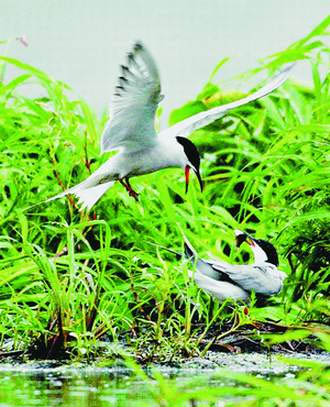| Home / Environment / News | Tools: Save | Print | E-mail | Most Read |
| Migratory Birds Put Local Authorities on Alert |
| Adjust font size: |
Liu Huajin grows more and more tense the closer spring gets. Liu, an official at Xingkai Lake Natural Reserve in northeast China's Heilongjiang Province, is responsible for preventing outbreaks of avian flu at the reserve. At a time when millions of birds from southern China and Southeast Asia are stopping at the lake to rest on their way back to Russia and other neighboring countries, the burden of this responsibility grows particularly heavy.
"The temperature is rising. The ice on the lakes is melting, which is attracting more birds," he said. The situation exposes the reserve, which sits along the China-Russia border, to possible bird flu outbreaks. "It is a vital time for anti-bird flu work as tens of thousands of birds come here every day," Liu said after a recent trip out to an observation post. "All 41 of our staff members are working on the issue. The whole reserve is on high alert." Local authorities have mapped out a package of policies to prevent outbreaks of avian flu this year. They include a regional surveillance system and efforts to distribute basic information about the disease to local residents. The authorities have so far set up 10 observation posts within the reserve. They issue daily reports on any suspicious or abnormal activity by migratory birds. If dead birds are found in the reserve, they are immediately collected and taken to the bird flu laboratory in Harbin, the provincial capital, for testing, Liu said. The area surrounding where the dead birds are found is placed under quarantine. In addition, more than 100 local residents, including farmers and fishermen, have been given basic training about how to deal with avian flu, Liu said. Xingkai Lake is only one of many stops for migratory birds in Heilongjiang Province. Its dense river systems and vast plains make it an ideal place for birds to rest during their migrations. Twelve national-level and 47 provincial-level observation posts have been established within the province, said Tao Jin, chief of the Heilongjiang Provincial Forestry Department's wildlife protection office. "We have found several dead birds, but none of them were infected with avian flu," Tao said. "This is a difficult period for Heilongjiang Province, one of the major stopovers for migrant birds in northern Asia," said Li Xiaomin, an ornithologist from Northeast Forestry University. Wild geese and pigeons are believed to be the main suspects in carrying the deadly H5N1 strain of the virus. "They will not leave until early next month," said Li. He said people should avoid touching these birds and make sure they kept their poultry in enclosed spaces to avoid possible infections. "This is a sensitive time and any mistakes could cause serious trouble," said Li. To prevent any outbreak of bird flu, Yin ChengJie, vice minister of agriculture, ordered comprehensive spring vaccinations around the nation and called for stricter monitoring work. (China Daily April 10, 2007) |
| Tools: Save | Print | E-mail | Most Read |
 |
| Related Stories |
|
||||
